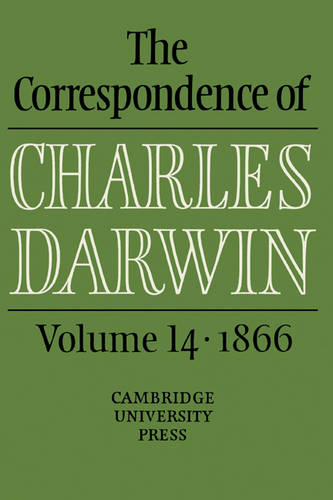
The fourteenth volume of Charles Darwin’s correspondence comprises all the surviving letters both from and to Darwin from the year 1866.
Thanks, perhaps, to a change of diet and getting more exercise, Darwin, although still far from well, was less ill in 1866 than in the three previous years. He was sufficiently well to revise On the Origin of Species for its fourth edition, and, by the end of the year, finally managed to submit to his publisher the manuscript of The Variation of Animals and Plants under Domestication (minus a final chapter he later dropped). This two-volume work was intended to be the first part of Darwin’s long-planned ‘big book’ on species—although (spoiler alert) he never got round to the other planned volumes.
1866 also saw the deaths of two of Darwin’s sisters, Catherine and Suzanne, after which his childhood home, The Mount in Shrewsbury, was put on the market.
Other highlights featuring in Darwin’s 1866 correspondence include:
- Darwin commending Alfred Russel Wallace for his recent paper on the biogeography of Malaysian butterflies, saying, “Such papers will make many more converts among naturalists than long-winded books such as I shall write if I have strength.”;
- Darwin rejecting recent new calculations for the age of the earth which indicated our planet was insufficiently old for evolution to have produced its vast current biodiversity. Darwin wrote, “I am bigotted to the last inch, & will not yield. I cannot think how you can attach so much weight to the physicists”;
- Darwin joking that his (we now know, very wrong) hypothesis of pangenesis is so ‘abominably wildly, horridly speculative’ that it is worthy of the philosopher Herbert Spencer;
- Darwin explaining that he has always followed his friend the geologist Charles Lyell’s advice and avoided controversy;
- Darwin providing a potted autobiography to inform a memoir of him in the latest volume of Portraits of Men of Eminence;
- Darwin co-signing a letter to William Gladstone , Chancellor of the Exchequer, urging for the establishment of a natural history collection independent of the British Museum;
- Darwin seemingly amused at the audacity of Richard Owen for now effectively claiming natural selection as his own idea—even though he had previously pooh-poohed it;
- Thomas Henry Huxley subsequently delighting in the ‘unmerciful basting’ Darwin has given ‘Our Mutual friend’ (Owen) is his revised Historical Sketch on the Origin of Species;
- Alfred Russel Wallace urging Darwin to drop the term natural selection and adopt the term coined by Herbert Spencer, survival of the fittest;
- Darwin trying to persuade his publisher, John Murray, to have the folded page-edges of the latest edition of On the Origin of Species pre-cut, rather than leaving the cutting to the readers. (See also Murray‘s explanation for why publishers didn’t cut the pages);
- Joseph Dalton Hooker informing Darwin of a new ‘discovery’ that sunspots are determined by the current position of the planets;
- Mary Boole asking Darwin about the compatibility of his theory of evolution by means of natural selection with her religious views (and Darwin’s response);
- Darwin, who struggles reading German, ‘groaning & swearing at each sentence’ in a book by Ernst Haeckel;
- Darwin’s old shipmate Bartholomew James Sulivan reporting having met Fuegians in Bristol, one of whom was the son of one of the Fuegians who had travelled on HMS Beagle;
- Darwin subsequently asking for someone to make observations of how Fuegians express emotions.
As with all the volumes in this series, this book is really aimed at people with a serious interest in Charles Darwin. As with all the other volumes, every letter is annotated with meticulously researched footnotes explaining its context and references. The series as a whole is a masterpiece of scholarship.
- Buy this book from Bookshop.org (UK) and help tax-paying, independent bookshops.
- Buy this book from Amazon.co.uk
- Buy this book from Amazon.com